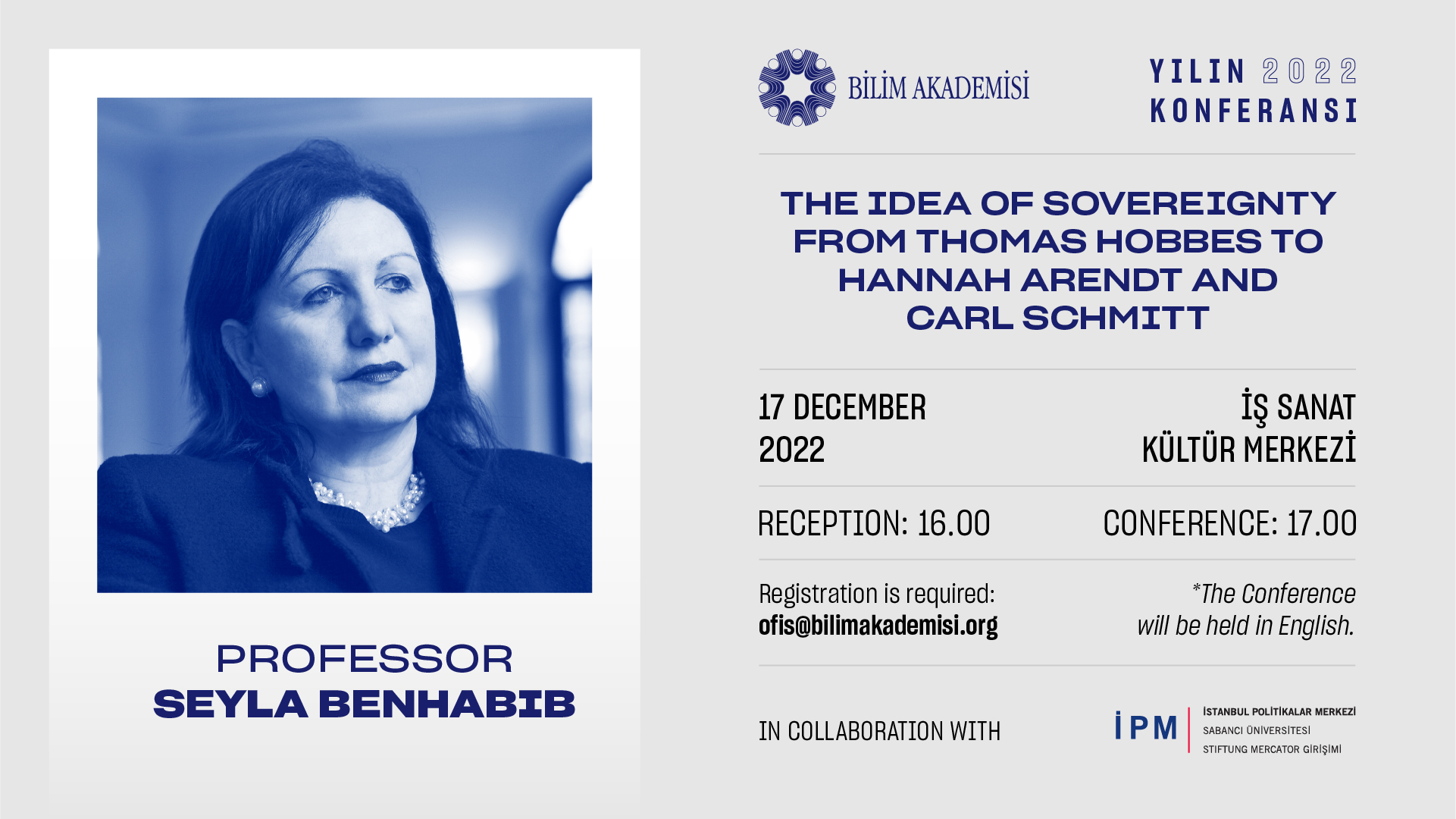Bilim Akademisi 2016 yılından beri her yıl düzenlediği Yılın Konferansında bu yıl Seyla Benhabib’i ağırlıyor.
“The Idea of Sovereignty from Thomas Hobbes to Hannah Arendt and Carl Schmitt”
Seyla Benhabib
17 Aralık 2022, Cumartesi saat 17:00
Konferans davetiyesi için lütfen tıklayın. Konferans dili İngilizcedir.
Katılım kayıt gerektirir. Kayıt için [email protected]
“The Idea of Sovereignty from Thomas Hobbes to Hannah Arendt and Carl Schmitt”
Abstract:
Sovereignty is a seminal concept in modern political thought, migrating from the absolutist vision of Thomas Hobbes in his Leviathan of 1651 to Jean-Jacques Rousseau’s work a century later in The Social Contract. With Rousseau’s work sovereignty assumes its central place in modern theories of democratic self-governance.
Yet, as Hannah Arendt as well as Carl Schmitt have pointed out, Rousseau’s reformulation of sovereignty in terms the “will of all” and “the general will” is hardly democratic. Arendt argues that sovereignty is opposed to an emancipatory politics because it reduces the plurality of political life to univocity; Schmitt argues that sovereignty is a privilege of the state and not of the people. Hence, Schmitt’s famous sentence- “Sovereign is he who decides on the exception.”
Distinguishing between sovereignty as applied to the state and the concept of ‘popular sovereignty,’ this lecture will discuss transformations of state sovereignty under conditions of neo-liberal financial globalization. I will argue that the aspirations expressed as ‘popular sovereignty’ must be reformulated without recourse of a metaphysics of substance. What forms of self-governance can we imagine in a post-sovereign context?
Bio:
Seyla Benhabib, born in Istanbul, Turkey, is the Eugene Meyer Professor of Political Science and Philosophy at Yale University and was Director of its Program in Ethics, Politics and Economics from 2002 to 2008. Professor Benhabib is the recipient of the Ernst Bloch prize for 2009 (one of Germany’s most prestigious philosophical prizes) and of the Leopold Lucas Prize from the Theological Faculty of the University of Tubingen for 2012. She was the President of the Eastern Division of the American Philosophical Association in 2006-07 and has been a member of the American Academy of Arts and Sciences since 1995. She has previously taught at the New School for Social Research and Harvard Universities, where she was Professor of Government from 1993-2000 and Chair of Harvard’s Program on Social Studies from 1996-2000. A Guggenheim Fellowship recipient (2011-12), she has been research affiliate and senior scholar in many institutions in the US and in Europe such as Berlin’s Wissenschaftkolleg (2009).
Professor Benhabib holds Honorary Degrees from the Universities of Utrecht (2004), Valencia (2010) and Bogazici University in Istanbul (2012), Georgetown University (2013) and the University of Geneva, School of the Social Sciences (2017).
She is the author of Critique, Norm and Utopia. A Study of the Normative Foundations of Critical Theory (1986; German, Kritik, Norm und Utopie, Fischer Verlag, 1992); Situating the Self. Gender, Community and Postmodernism in Contemporary Ethics (1992; winner of the National Educational Association’s best book of the year award; German, Selbst im Kontext, Suhrkamp 1995) ; together with Judith Butler, Drucilla Cornell and Nancy Fraser, Der Streit um Differenz 1993; in English, Feminism as Critique (1994); The Reluctant Modernism of Hannah Arendt (1996; reissued in 2002; Hannah Arendt und die Melancholische Denkerin der Moderne,Suhrkamp 2006); The Claims of Culture. Equality and Diversity in the Global Era, (2002); The Rights of Others. Aliens, Citizens and Residents (2004), which won the Ralph Bunche award of the American Political Science Association (2005) and the North American Society for Social Philosophy award (2004); translated as Die Rechte der Anderen (Suhrkamp 2008); Another Cosmopolitanism: Hospitality, Sovereignty and Democratic Iterations, with responses by Jeremy Waldron, Bonnie Honig and Will Kymlicka (Oxford University Press, 2006); German, Kosmopolitismus und Demokratie (Campus 2008), and Dignity in Adversity. Human Rights in Troubled Times (UK and USA: Polity Press, 2011). She has most recently edited, together with Judith Resnik, Migrations and Mobilities: Gender, Borders and Citizenship (NYU Press, 2009; named by Choice one of the outstanding academic books of the year), and also, Politics in Dark Times. Encounters with Hannah Arendt (Cambridge: Cambridge University Press, 2010)
Her work has been translated into German, Spanish, French, Italian, Turkish, Swedish, Russian, Serbo-Croatian, Hebrew, Japanese and Chinese and she has also edited and coedited 10 volumes on topics ranging from democracy and difference to feminism as critique; the communicative ethics controversy and identities, allegiances and affinities.
Professor Benhabib has held many prestigious visiting professorships such as the Spinoza chair in Amsterdam (2001); the Gauss Lectures at Princeton (1998); the John Seeley Memorial Lectures (Cambridge University, 2002), the Tanner Lectures (Berkeley, 2004) and was the Catedra Ferrater Mora Distinguished Professor in Girona, Spain (Summer 2005).
She has been Adjunct Faculty in Law at the Yale Law School (2011; 2008; 2007); a Visiting Professor of Law at the University of Tel-Aviv’s Zvi Meitar Center for Advanced Legal Studies (2010) and was a Straus Fellow at NYU’s Straus Center for Advanced Studies in Law and Justice (2011-2012). She was the Diane Middlebrook and Carl Djerassi Visiting Professor, Center for Gender Studies at the University of Cambridge, UK (Spring 2017) and has been elected as Corresponding Fellow to the British Academy of the Humanities and Social Sciences (Summer 2018)
Professor Benhabib is Senior Fellow at the Center for Contemporary Critical Theory at Columbia University and was a Scholar in Residence at the Columbia Law School (2018-19), where in Spring 2019, she held the Chair of James S. Carpentier Visiting Professor of Law.




